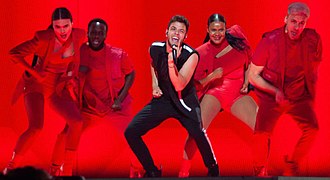| Switzerland in the Eurovision Song Contest | |
|---|---|
| Eurovision Song Contest | |
 | |
| Participating broadcaster | Swiss Broadcasting Corporation (SRG SSR) |
| Participation summary | |
| Appearances | 65 (54 finals) |
| First appearance | 1956 |
| Highest placement | 1st: 1956, 1988, 2024 |
| Host | 1956, 1989, 2025 |
Participation history | |
| External links | |
| Switzerland's page at Eurovision.tv | |
| Switzerland in the Eurovision Song Contest 2025 | |
Switzerland has been represented at the Eurovision Song Contest 65 times since its debut at the first contest in 1956, missing only four contests because of being relegated due to poor results the previous year: 1995, 1999, 2001, and 2003. Switzerland hosted the inaugural contest in 1956 in Lugano, where it also won. The country claimed its second victory in 1988, 32 years after the first, and its third in 2024, 36 years after the second win. The Swiss participating broadcaster in the contest is the Swiss Broadcasting Corporation (SRG SSR).
Contents
- Participation
- Selection methods
- Participation overview
- Congratulations: 50 Years of the Eurovision Song Contest
- Hostings
- Awards
- Marcel Bezençon Awards
- Related involvement
- Conductors
- Heads of delegation
- Commentators and spokespersons
- Photo gallery
- See also
- Notes
- References
" Refrain " performed by Lys Assia won the inaugural contest in 1956 for Switzerland; she returned to place second in 1958 with "Giorgio". The country achieved second place with "T'en va pas" by Esther Ofarim (1963) and "Pas pour moi" by Daniela Simmons (1986), and third place with "Nous aurons demain" by Franca di Rienzo (1961) and "Amour on t'aime" by Arlette Zola (1982). It won for the second time in 1988 with " Ne partez pas sans moi " performed by Céline Dion. "Moi, tout simplement" by Annie Cotton secured Switzerland's 15th top-five finish by placing third in 1993.
Since the introduction of the qualifying round in 1993, Switzerland has reached the top ten six times. Since the semi-final round's inception in 2004, the country has failed to reach the final in 11 of 19 contests, finishing last in the semi-final on four occasions. Switzerland returned to the top five after 26 years when "She Got Me" by Luca Hänni finished fourth in 2019, achieving the country's 16th top-five result. This was followed by " Tout l'univers " by Gjon's Tears placing third in 2021, marking the 17th top-five finish. Switzerland won the contest for the third time in 2024, with "The Code" by Nemo. The country has also finished last in the semi-finals four times since 2004, with "Celebrate" by Piero and the MusicStars (2004), "Il pleut de l'or" by Michael von der Heide (2010), "Time to Shine" by Mélanie René (2015), and "The Last of Our Kind" by Rykka (2016).





















